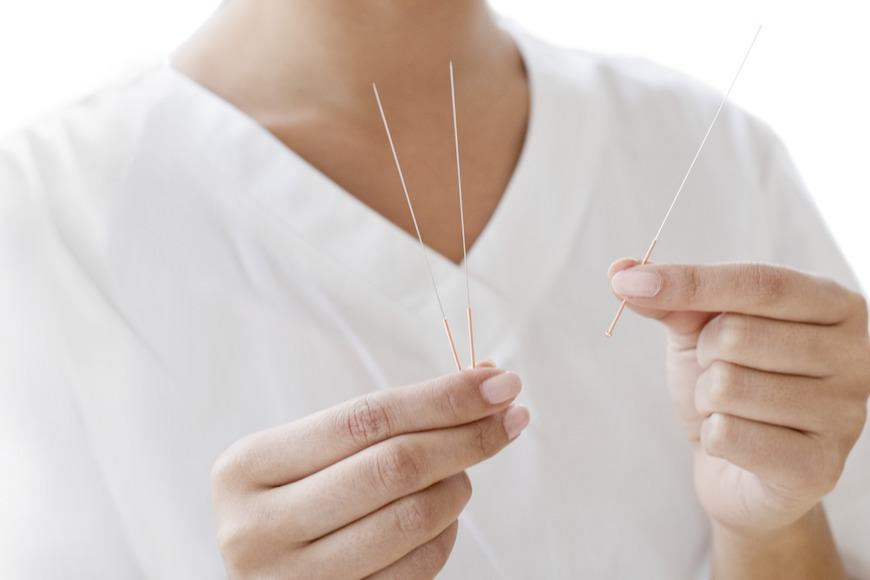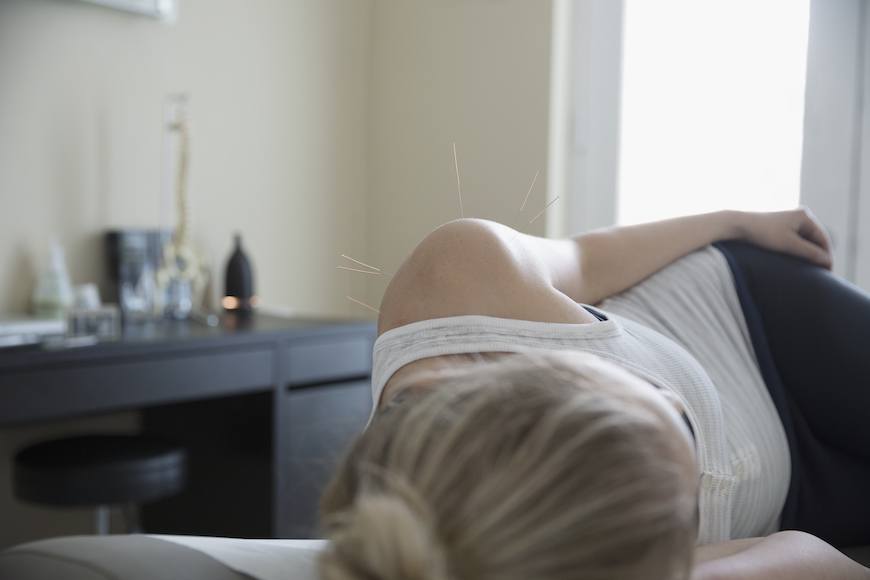Acupuncture Is Officially Going Mainstream—but Will It Work for You?
If you ask a Traditional Chinese Medicine (TCM) practitioner to break it down, they'll tell you that it all has to do with chi (also spelled qi)—an energy current that's said to run through our bodies via energetic pathways referred to as meridians. TCM recognizes twenty meridians, 12 of which are linked to internal organs, and scholars have mapped out over 400 points on the body where these pathways can be manipulated.
This is where acupuncturists come in—if you have a health concern, they insert around a dozen thin needles into various meridian points, depending on your specific symptoms. The needles stay in place between 5 and 30 minutes, supposedly helping balance the flow of chi and making you feel better in the process.
While western medicine still hasn't been able to definitively confirm how acupuncture works—chi and meridians are invisible, after all—it hasn't stopped millions of Americans from turning to it as a complimentary therapy for pain, seasonal allergies, skin health, and more. The mainstream medical world, too, is recognizing its benefits, with more and more US hospitals adding it to their treatment protocols. But can it be helpful for whatever ails you, specifically?

{{post.sponsorText}}
Keep reading to find out whether acupuncture might work for you.

Is acupuncture an effective treatment for my health issue?
First off, it's important to note that acupuncture isn't a fad—it's an ancient practice that originated in China around 100 BC, and then spread to Korea and Japan before finding its way west.
As such, the medical community's had a lot of time to research it in depth. And a growing body of data indicates that it's a promising treatment for a wide range of conditions, particularly those associated with pain. The most comprehensive study on the effects of acupuncture took place over six years and was completed in 2012. The study was sponsored by the National Institutes of Health and published in Archives of Internal Medicine. Dr. Andrew J. Vickers, attending research methodologist at Memorial Sloan Kettering Cancer Center in New York, led the study and analyzed raw data from 25 international studies covering the results from 17,500 patients.
In the control groups studied, the results found that 30 percent of patients who suffered from chronic pain reported improvements from undergoing acupuncture treatments. This is considered solid evidence that acupuncture—either alone or combined with Western medical treatments—is helpful for alleviating pain, including migraines, arthritis, and other forms of chronic pain.
In the same study, it wasn't proven or disproven in any meaningful way whether acupuncture is effective in treating other health conditions. But the World Health Organization lists several conditions for which acupuncture has been shown to have a positive impact. These include high and low blood pressure, chemotherapy-induced nausea and vomiting, painful periods, allergic rhinitis, and morning sickness, among many others. There's also evidence that it can help improve libido, support fertility, reduce insomnia, balance the stress response, and more.
Clearly, all those little needles are doing something. And scientists are beginning to understand more about how they affect the body. "These days, acupuncture has achieved some legitimacy thanks to research linking it with the release of endorphins—which shows this modality can affect pain pathways in the brain and nervous system," wrote Chinese medicine practitioner Jill Blakeway, DACM, in an article for Well+Good. "Neuroimaging studies demonstrate that acupuncture also calms areas of the brain that register physical discomfort and activates those involved in rest and recuperation. That’s not all: Doppler ultrasound shows that acupuncture increases blood flow in treated areas, and thermal imaging proves that it can make inflammation subside."
But, again, the hows and whys aren't yet totally clear. While many believers think acupuncture really does balance vital chi energy, others claim it's the placebo effect at work, although that doesn't make it any less effective. (You know, the phenomenon whereby someone takes a fake drug believing it'll work—and their symptoms actually subside.)

What do you need to know before having acupuncture?
According to Medical News Today, there really aren't any risks to trying acupuncture if you think it might help you—performed correctly, it can be safely combined with other treatments and has very few side effects. (The most common ones are soreness and minor bleeding or bruising where the needles were inserted.) Given that it can help control some types of pain, it may help patients who can't (or don't want to) take pain medications.
More serious side effects can occur if the practitioner isn't properly trained, which is why Mayo Clinic suggests asking for recommendations and checking your practitioner's credentials. To find a licensed practitioner, visit the website for the National Certification Commission in Acupuncture and Oriental Medicine (NCCAOM). Most states require practitioners to be licensed by this board.
Before your treatment, Mayo Clinic also recommends interviewing the practitioner. Ask what's involved in the treatment, how likely it is to help your condition, and how much it will cost. According to Costhelper Health, an acupuncture session and medical consultation should cost from $75 to $95, and a routine visit should cost between $50 and $70. (Your insurance may cover acupuncture—check with your provider to find out.) Expect to have several sessions, since experts say it often takes months before you start to see results.
And no, the needles don't hurt—at least, not according to this Well+Good editor who tried acupuncture and reported back on what to expect from your first visit. In her case, she felt some anxiety relief after one session. But ultimately, the only way to know whether it'll work for you is to give it a try.
Scared of needles? You could also experiment with essential oils or tai chi for minor aches and pains.
Loading More Posts...